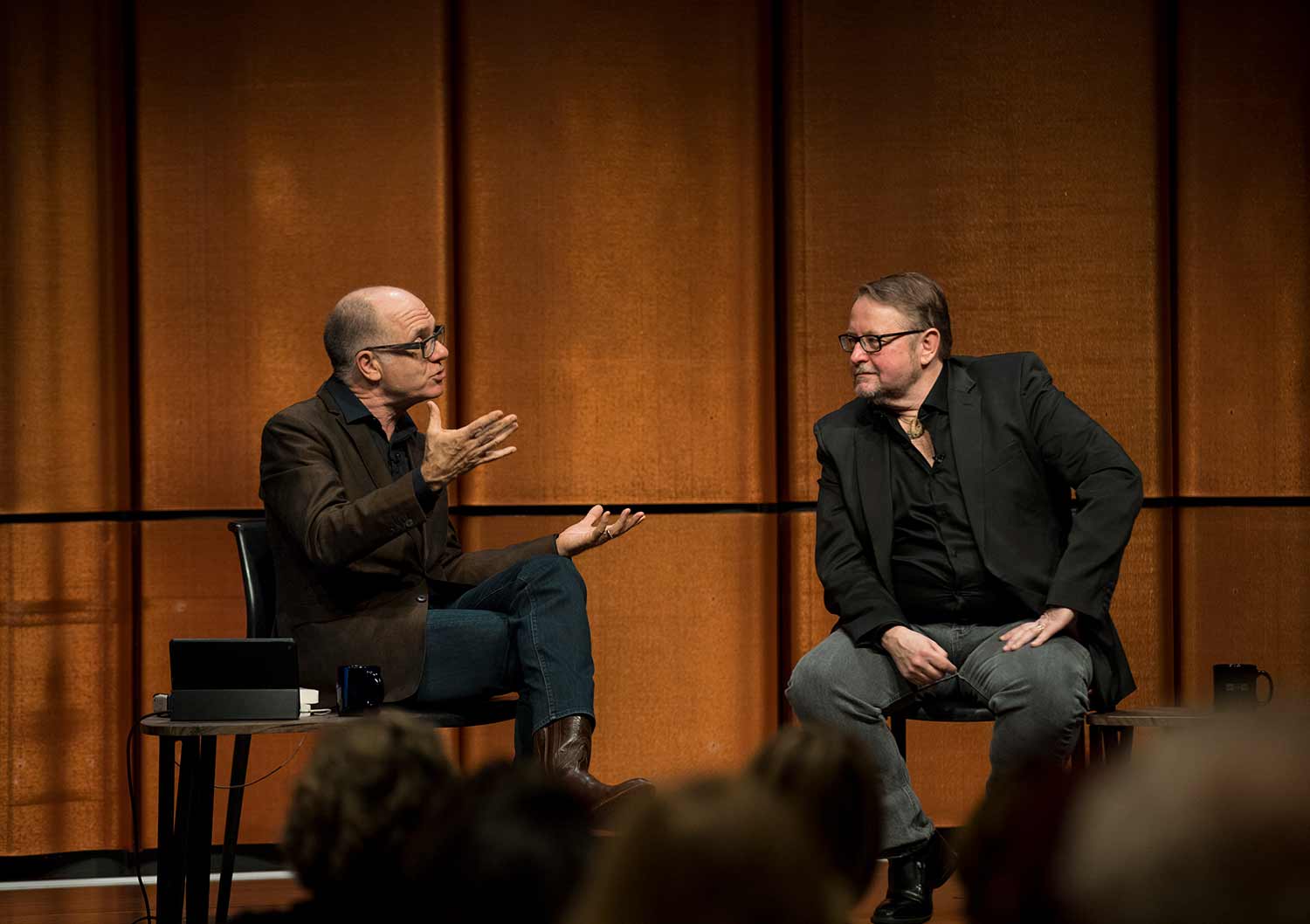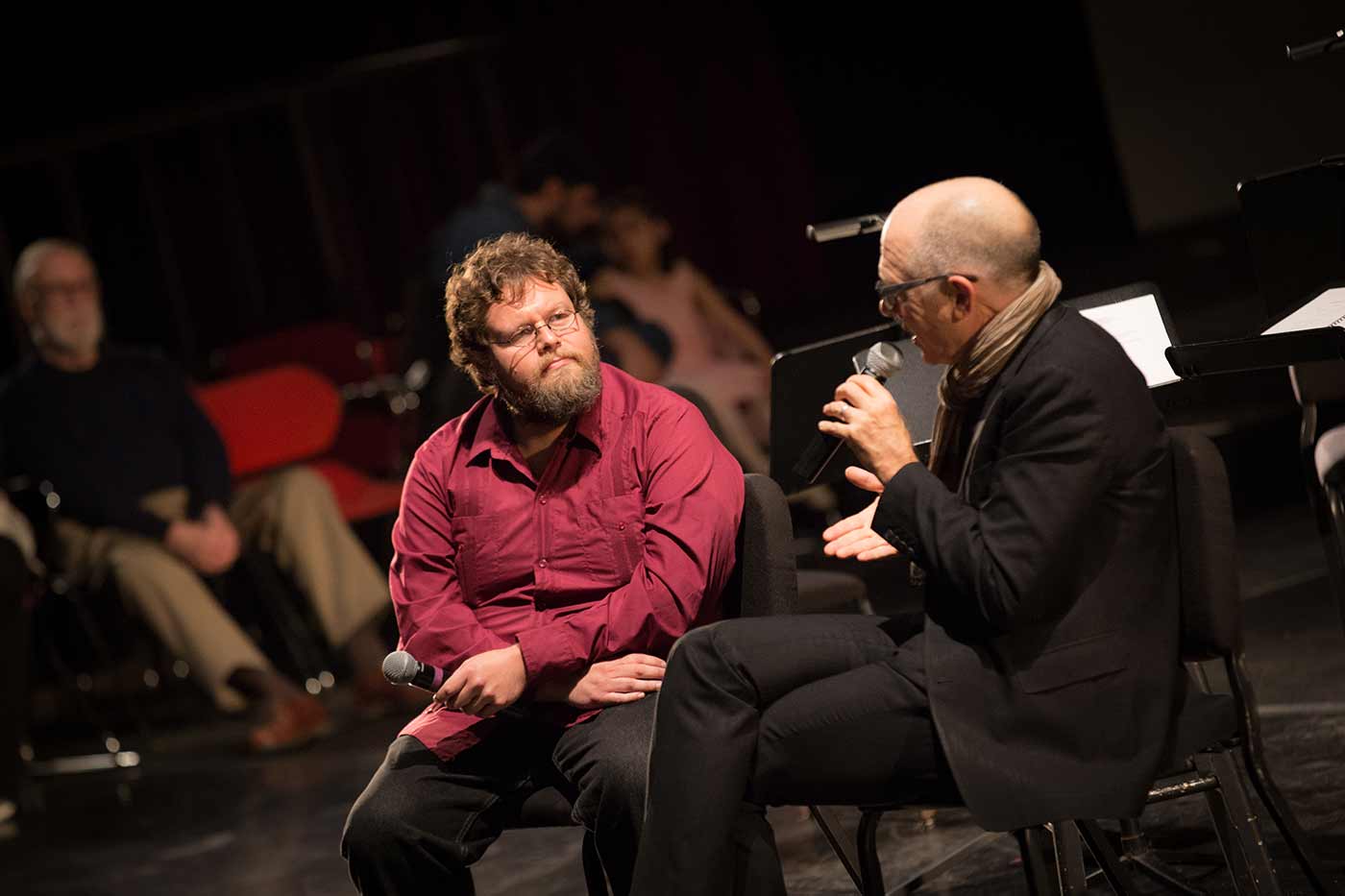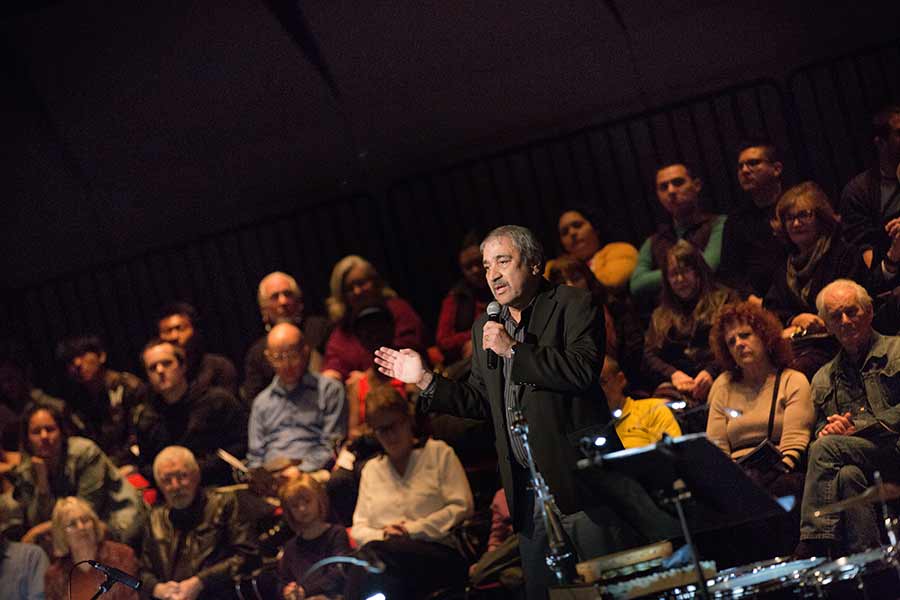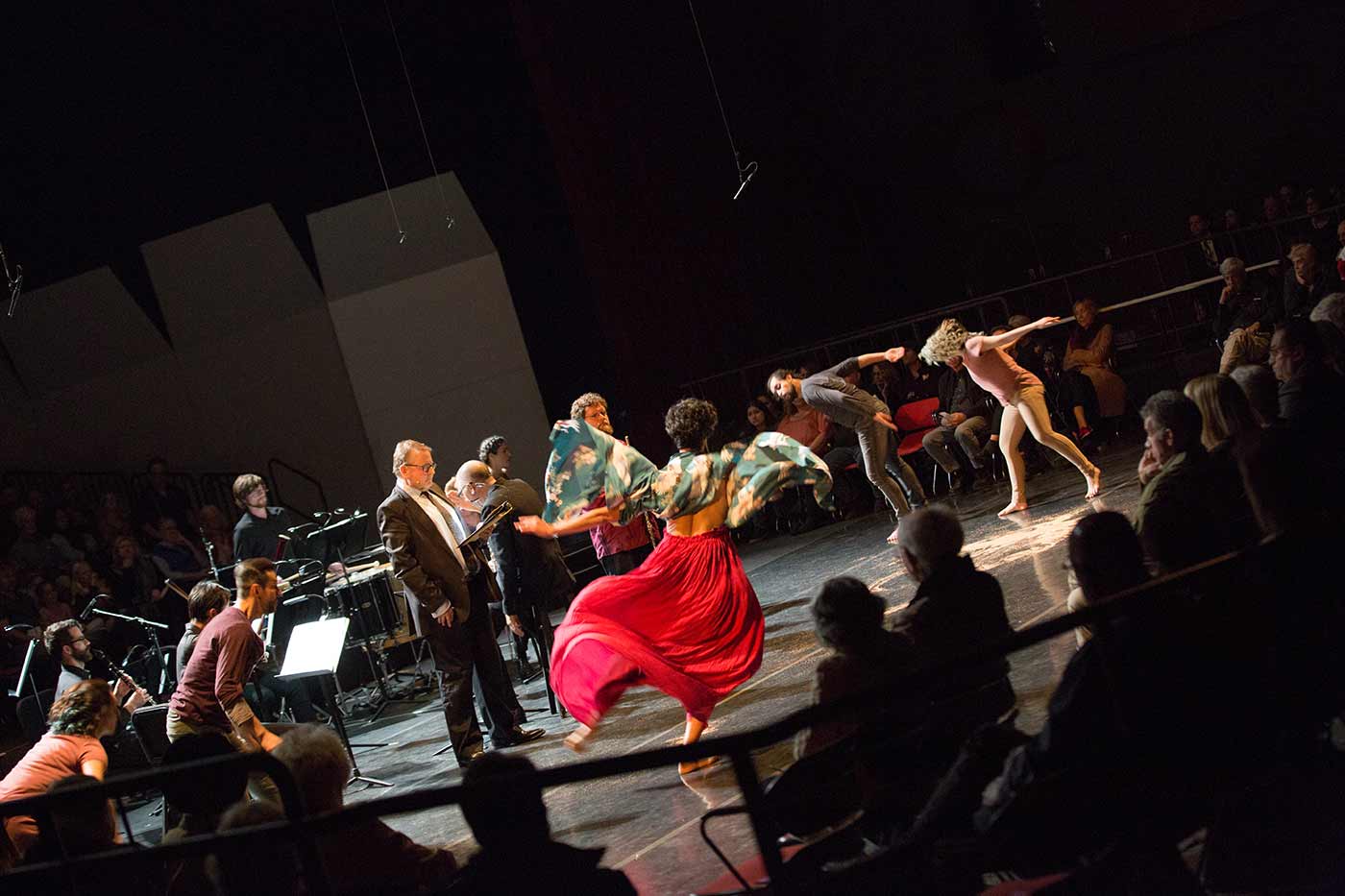By:
- Anthony King
Published Date
By:
- Anthony King
Share This:

From left, Reed Family Presidential Chair in Music holder Steven Schick with UC San Diego literature alumnus Luis Alberto Urrea at the San Diego Central Library Feb. 1. Photos by Farshid Bazmandegan.
From Borders to Bridges
Work of UC San Diego alumnus highlighted in Department of Music's Reed Family Concert
Called a “border writer more interested in bridges,” Luis Alberto Urrea received a welcome homecoming the first week of February, when the UC San Diego alumnus returned to partake in a groundbreaking music and literature festival like no other.
Now a prolific, best-selling author, the Department of Literature graduate was born in Tijuana, living the first part of his youth in Mexico before moving to San Diego after a serious wave of tuberculosis swept through the city in the late 1950s. Hit hard by infection himself, Urrea slowly recovered and the family stayed in the United States.

Luis Alberto Urrea signs copies of “The Tijuana Book of the Dead” for guests Feb. 1.
“To me, Tijuana was a wonderland,” Urrea told a packed house at the San Diego Central Library Feb. 1, where he was the featured guest for UC San Diego Extension’s Helen Edison Lecture Series. “It’s hard for me to express how awesome it was. It was this place where anything was possible.”
With ties throughout Mexico, he alternated school in the U.S. with long summer trips to visit extended family—sometimes taking 20-hour bus rides deep into the heart of the country. It was there, and in Tijuana, where Urrea met many of the “characters” who would fill his future books.
At first, though, drama caught his attention, and he began UC San Diego as a theater major, spurred on in part by a campus visit from Lily Tomlin in 1976. But being a writer and storyteller at heart, it was the literature department that ultimately led him to graduation day—though only after another touch of tragedy.
From tragedy to triumph
“In my senior year at UC San Diego, my dad died in the hands of Mexican cops. It was a really awful experience for all of us,” Urrea said.
Urrea’s father was traveling back to San Diego from Mexico with money to give his son as a graduation gift and encountered the corrupt officials. He “died awfully in their care,” Urrea said and, adding to the pain, the officials forced the family to pay a fee in order to bury their father in an unmarked grave. They had no choice but to comply.
“And then I had to go back to school,” Urrea said. “I didn’t know how to express myself but by writing.”
With “vivid, jolting dreams” of his father, Urrea wrote. He wrote about the experience; wrote about the dreams. And, encouraged by a supportive professor named Lowry Pei, finished “Father Returns for the Mountain” in time for Pei to give it to the famed author Ursula K. Le Guin—who, as it turned out, was leading a UC San Diego Writers Conference in 1977.

From left, Department of Music professor Wilfrido Terrazas in conversation with Steven Schick before the Reed Family Concert Feb. 3.
She loved the piece. After working with Urrea, Le Guin offered to buy Urrea’s short story and publish it in an anthology. The two authors remained friends, supporting each other as writers until her death earlier this year.
“In a lot of ways, my father gave his life to give me everything,” Urrea said.
Urrea has gone on to many accolades in his career, including being named a 2005 Pulitzer Prize finalist and a member of the Latino Literature Hall of Fame. With next month’s release of “The House of Broken Angels,” Urrea has 18 books to his name spanning all genres: essay, fiction, poetry, cartoon, journalism.
His collection of short stories, “The Water Museum,” was a finalist for the 2016 PEN-Faulkner Award, and the 2009 novel “Into the Beautiful North” was praised by the National Endowment of the Arts. “The Devil’s Highway,” recounting the true story of a group of Mexican immigrants lost in the Arizona desert, won the Lannan Literary Award and was a finalist for the Pacific Rim Kiriyama Prize, which he ultimately won in 2005 with his historical novel “The Hummingbird’s Daughter.”
There are many honors and genres, but it was in part poetry that brought Urrea to San Diego from Illinois, where he is a distinguished professor of creative writing at the University of Illinois at Chicago.
Melding poetry, music and dance
Urrea’s book of poems “The Tijuana Book of the Dead”—a moving account he calls a cry against the current political climate for immigrants—landed in the hands of Steven Schick of the Department of Music, who happened to be in the planning stages with the San Diego Symphony for a new festival celebrating both sound and place.

UC San Diego Chancellor Pradeep K. Khosla welcomes guests to the Reed Family Concert Feb. 3.
Schick holds the Reed Family Presidential Chair in Music at UC San Diego and is curator of the current “It’s About Time” festival. This year is also the 100th anniversary of the famous “Histoire du Soldat,” a Stravinsky classic that was written in the height of World War I and tells the story of a soldier who sells his soul to the devil for a violin. It is staged with a small music ensemble, with text and dance interlaced throughout.
But Schick didn’t want to do the traditional version for the festival, and he reached out to Urrea to offer up a new idea: they would replace the text with Urrea’s Tijuana poems and bring the story of the border to life.
This new, centennial version of Stravinsky’s masterpiece was presented Feb. 3 at the Department of Music’s Reed Family Concert. UC San Diego’s new flute professor Wilfrido Terrazas, a founding member of the Mexico City-based improvisation collective Generacion Espontanea, performed with the Tijuana dance collective Lux Boreal. Schick conducted UC San Diego students. Urrea read his poems.
“Our new version tells the story … about the daily flux of people crossing the border between San Diego and Tijuana,” Schick said. “This is not a re-examination of immigration issues, writ large, in the way they are presented in daily news reports. It’s not about a wall or who will pay for it, nor is it a recitation of the cold statistics of visas and vetting. Our piece is about people.”

During the Feb. 3 performance of “Histoire du Soldat,” featuring the Tijuana dance collective Lux Boreal.
The pair made the original story’s hero into a heroine, partly symbolizing the women who rise early to wait at the border, crossing to work in homes and restaurants in San Diego. Urrea’s poems—called “a prayer” by both Schick and the author—hint at his own past, too.
“I thought, how could we talk about these people without lumping them into this anonymous conversation about immigration, which is frankly so frustrating and so numbing because it’s always about numbers, it’s never about names,” Schick said. “And it feels to me as if these are people whose names need to be told, whose stories need to be related. It roots this experience we’re having in San Diego to a broader cultural context.”
Urrea said he feels responsible in all his writing to the many characters that appear in his work. From his father and friends he grew up with in Tijuana, to the border agents he interviewed for “The Devil’s Highway,” he doesn’t want to misrepresent anyone, he said.
“There’s a reason those stories are there, and there is a matrix of our humanity that unites us,” Urrea said. “There is no them. There is only us.”
Share This:
You May Also Like
Stay in the Know
Keep up with all the latest from UC San Diego. Subscribe to the newsletter today.



